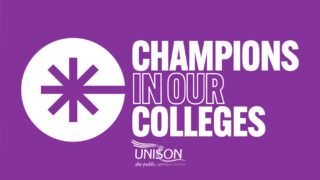A busy afternoon’s debates on education opened included a commitment that UNISON would oppose government policies on academies.
But Pam Howard for the executive also stated that there had to be a two-strand approach, where the union also organised within academies when and where they exist.
She added that this also “gives us recruitment and organising opportunities – opportunities that we need to take,” and that this would include working alongside other school unions where possible.
Lee Spate from Portsmouth stressed that an organised and strong response after the announcement earlier this year that all schools were to be forced to become academies, was crucial in making education secretary Nicky Morgan assert that this would not be the case.
Delegates raised the issue of “maximising solidarity” when teachers are likely to be taking strike action on the issues.
Roger Bannister told delegates of how Knowsley is to lose it’s last sixth form, A’ level provision later this year. The City of London and the Isles of Scilly are the only other ‘boroughs’ in the UK where that is the case.
The school – an academy – made the announcement in March and refused to explain itself. A petition to the government was rejected because “it is about something that the UK government or Parliament is not responsible for,” said the government’s petition website.
Yet another delegate, from the Midlands, told of how, in Sandwell, one academy school was making bulk buys of Mercedes cars every two years to give senior staff for making cuts.
Danny Judge from Ealing, who works in a special needs school, said that, although his borough only has a few academies, that’s where most of the union’s problems come from.
“There’s no link between schools becoming academies and improving standards,” he said.
On further education pay, conference urged the executive to campaign for fair pay in the sector.
Dave Ellis for the national further education and sixth form colleges committee reminded the hall of the years of attacks on the pay of further education staff.
For them to catch up, they would need an immediate rise of between “17% and 19%”, he told delegates.
“Our negotiators can only ever be successful, if you, the rank and file, stand behind us and support us,” he said.
“Go back to your branches and ask them to support further education,” he urged, or “further education will remain in the doldrums”.
Nixon Todd for the executive said that, since 2010, the sector has lost £1.2bn – “from predominantly working-class people”.
But, he told them that, setting aside all the doom-and-gloom statistics, “the point is not just to understand the world, but to change it”, and reiterated the call for support for the sector, and also called for community campaigns to support further education.
The conference also called on the executive to campaign to win a seat on planned local area reviews that could see funding cut.
Hazel Perry, for the national further education and sixth form colleges committee, cited the attacks on further education that affect adults in particular.
“We need trade unionists to sit on review bodies” to combat the utilitarian culture of education of the benefit of business alone, she said.
Rena Wood from the North West highlighted the impact of attacks on further education for adults from a working class background, but who left school with few qualifications and can improve their educational situation later in life.
The union needs to fight to defend career development for school staff, delegates decided.
Joyce Guthrie from the Northern region told conference that the last six years had seen a decline in career development for members in schools – including seeing contracts and jobs slashed.
After so much progress being made in the years before, she said, this represented a “total disregard for the impact on staff and educational standards”.
“Our members are entitled to a career and not just a job that can be extinguished at the drop of a hat,” noted another delegate.
Kim Russell from the service group executive said that UNISON had led the way, across the UK, to boost the profile and position of school support staff.
“Our members deserve continuing professional development”, she said, before concluding by noting that UNISON is the union for schools support staff”.
A raft of actions on the issue included supporting regions and branches, encouraging branches to use union learning to help to develop school-based staff and working alongside teaching and other education unions, parents and education campaigners to defend education.
Delegates also agreed to continue to campaign for a funding formula that recognises the diverse needs of populations.







